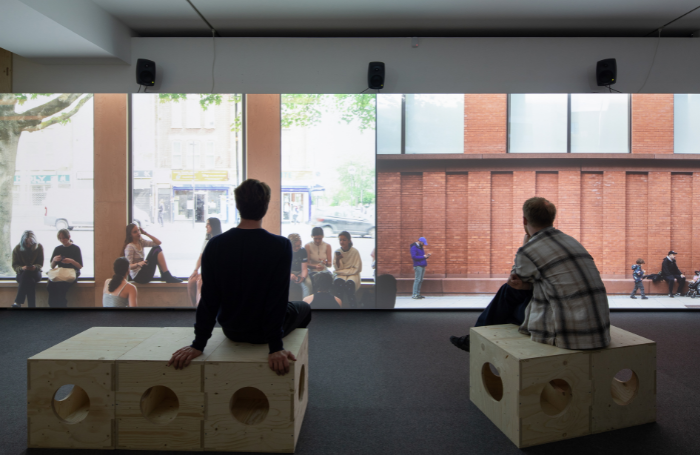The Architect Has Left The Building is the latest exhibition by the Royal Institute of British Architects (RIBA), showcasing work by photographer and filmmaker Jim Stephenson.
A dual-screen film installation will reveal how people use the spaces created by architecture, left to their own devices. Buildings are often documented at their point of completion but this exhibition will explore what happens once the architect has returned to their studio and inhabitation has begun. It will draw together the moments of humanity that so often capture Stephenson’s imagination and present them as a series of vignettes examining the multitude of ways that people naturally occupy both the interiors and exteriors of buildings.

The show has been created in response to the theme of this year’s London Festival of Architecture, which is ‘In Common’. Displayed as a dual-screen installation, the exhibition will work on different scales to explore the idea and impact of a ‘shared place’ and the contextual detailing that makes them successful. In this form, The Architect Has Left The Building will ask its audience to pause for a moment, and imagine the stories that are unfolding on the screen, while offering an opportunity to reflect and immerse themselves in the vision of the filmmaker, a vision that creates a space for the viewer to engage with a subtle visual connectivity that spans fifteen years of Stephenson’s career.
The work, edited and sequenced with photographic artist Sofia Kathryn Smith, features a soundscape composed by long-time collaborator Simon James.
A wide range of projects and people are featured in the installation, ranging from schools in Hackney, east London and Berkshire, to galleries and museums stretching from Cornwall to the Lake District. Stirling Prize-winning universities are used to show how the very best architecture in the country can frame daily life, while a community centre in West London reveals the small moments created when different groups use a single building.
The presentation aims to quietly disrupt the traditionally neat visions of these perhaps familiar buildings often presented to the public, and instead offers a textural, atmospheric experience - a theme that runs throughout much of Stephenson’s work.
Featured in The Architect Has Left The Building:
● National Youth Theatre by DSDHA
● Cambridge Mosque, Marks Barfield
● Airdraft, Benedetta Rogers and Thomas Randall Page
● Kingston, Grafton
● Magdalene Library, Niall McLaughlin
● Windermere Jetty Museum, Carmody Groarke
● Horris Hill, Jonathan Tuckey
● Yorkshire Sculpture Park, Feilden Fowles
● Tate St Ives, Jamie Fobert
● Tintagel Bridge, William Matthews
● London Bridge, Grimshaw
● Sands End, Mae
● Brittania Leisure Centre, Faulkner Brown
● Hackney New School, HenleyHalebrown
Jim Stephenson said:
“During the making of this new film for the exhibition, we took the opportunity to slow down and reflect on the way our work forms part of a narrative that the buildings go through after completion and now we’re asking the audience to do the same. We hope that they’ll enjoy the chance to pause as well, and observe how these spaces are used, misused, what they have in common and what makes them different.”
Notes to Editors
- Press contact: rob@robertfiehn.com / bobby@bobby-jewell.com
- Press images can be downloaded here.
- An exhibition press view will take place at 09.00-10.30am Wednesday 31st May 2023.
- A programme of events will run alongside the exhibition - Fast Forward Talks on the 15 June, RIBA Late 22 June and Film Night on the evening of 6 July with Laura Mark and curator Pete Collard.
- The Royal Institute of British Architects (RIBA) is a global professional membership body that serves its members and society in order to deliver better buildings and places, stronger communities and a sustainable environment. http://www.architecture.com. Follow @RIBA on Twitter for regular updates.
- Biography of Jim Stephenson: Jim has a degree in Architectural Technology, and after working in practice for several years both in the UK and US, he turned to photography (over 15 years ago) and has been working internationally ever since. He is also the founder of the non-profit arts organisation Miniclick which has striven to eliminate the culture of gatekeeping in the photography world for over 10 years. His photography and filmmaking work is hallmarked by a passion for community led projects, and a keen eye for human interaction with architecture and design, often reflecting the multi-sensory experience of spending time in the build environment. Jim’s award winning photography and films have a mediative documentary style, and he has cultivated a specialist practice which allows for fleeting moments of light, and people at play to be celebrated. https://clickclickjim.com
- Biography of Sofia Smith: Sofia is a writer, researcher and visual artist with an educational background in English Literature, Critical Theory, Creative Writing and Fine Art Photography. She has worked in collaboration with artists, designers and photographers for many years, often in research, art direction and curatorial roles, as well as editing and planning. She is the co-founder of Capturing The Chimera; an arts education organisation that teaches interdisciplinary approaches to creativity and a curatorial member of the non-profit photography group Miniclick. Her personal work shows her interest in collaborative creative practice, acts of transformation, collection and compulsion, as well as an interest in mythology and folklore. Sofia is the studio manager at Stephenson& and brings her knowledge of storytelling to the pre- production and editing process. https://www.stephensonand.com
- Biography of Simon James: Simon James is a self trained sound artist whose work is exploratory and instinctive, focussed on timbral shaping, finding the sounds in between the sounds and the relationship between these and field recordings. www.simonsound.co.uk









